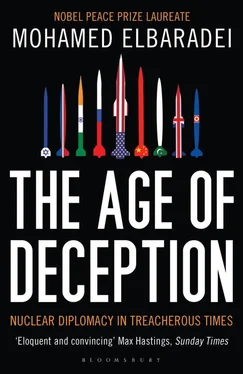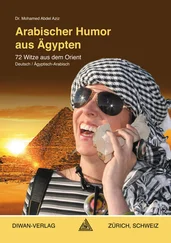The storm began almost immediately after I announced my decision. In September 2004 the Americans tried to amend a draft resolution on Iran to remove the standard statement of appreciation that referred to the Agency as “professional and impartial.” To an outside observer this might seem insignificant, but in diplomatic circles it was an overt slap. Peter Jenkins, the British ambassador, told me he found the move “churlish and petty.”
The United States began casting around for a candidate to run against me. Approaches were made to Brazil about putting forward UN High Representative for Disarmament Sergio de Queiroz Duarte. [2] Duarte at the time was the Brazilian ambassador-at-large for disarmament and non-proliferation. He also served as ambassador to the IAEA.
They approached Argentina about Roberto Garcia Moritan, an undersecretary in the Foreign Ministry. They asked Japan about Shinzo Abe, their former ambassador to Vienna. They pressured both Australia and Russia to support Alexander Downer, the Australian foreign minister. These requests went nowhere, so the Americans formally asked the Europeans to join them in urging the IAEA Board to postpone the end-of-December deadline for candidates. The Europeans refused.
The campaign to unseat me adopted new tactics. In November 2004, at about the time of George Bush’s reelection in the United States, news broke about the missing explosives from Al-Qa’qaa in Iraq. [3] The full account of the Al-Qa’qaa incident and its aftermath is given in chapter 3.
A barrage of misinformation ensued. A concocted story appeared about a clandestine nuclear weapons program in Egypt, tied to Libya’s efforts, that I was trying to cover up. Another article claimed that Blix and I had secret bank accounts in Switzerland, payback for our work in Iraq before the war. Still another asserted that Iran had deposited more than $600,000 in Aida’s bank account in Switzerland and had given me Persian carpets, each worth $50,000.
As reported by Dafna Linzer in the Washington Post , my phones were bugged in an attempt to find information to discredit me. [4] “IAEA Leader’s Phone Tapped,” December 12, 2004.
This was not the first time; we had seen earlier evidence of intercepted IAEA text messages and phone conversations. But now the issue had been reported in the news by an authoritative source. [5] Reuters reporters later said they were shown by Western diplomats what was purported to be transcripts of intercepted telephone conversations that I had held with the Iranian ambassador to the IAEA. Lou Charbonneau, “Rice on WikiLeaks Spy Charges: We’re Just Diplomats,” Reuters, November 29, 2010.
I was told that the tip about wiretapping had been leaked to the Washington Post by individuals at the CIA who were unhappy with the actions of certain people in the State Department. This did not surprise me: from mid-2004 to mid-2005, we had received copies of memos, briefings, and other information passed on confidentially from State Department staff who disliked the high-handed, insidious behavior of a few individuals.
In the end, the Americans were alone in their opposition to my candidacy. The four countries that normally follow their lead—Australia, Canada, Japan, and the United Kingdom—stayed for a time on the sidelines, saying privately that they supported me but refraining from any public declaration in order not to embarrass or isolate the United States.
One week before the IAEA Board met to make its decision, I was invited to Washington by Condoleezza Rice, now the secretary of state. With some hesitation, I decided to make the trip. At my meetings, Rice and Steve Hadley, her replacement as national security adviser, limited the discussion to the immediate issue at hand: Iran’s nuclear program and the U.S. conviction that Iran must be prevented from carrying out any stage of the fuel cycle. When I mentioned the need for some face-saving steps for Iran with respect to its enrichment program, Hadley interjected: “Iran must not have even one centrifuge spinning.” From that time forward, the phrase became a U.S. mantra.
Only afterward, at the end of my meeting with Rice, did she address my reelection. The Americans’ view on my serving a third term had not been personal, she said, only a consistent application of the U.S. policy of two terms for heads of UN agencies. Looking at each other, we both knew this wasn’t true, but I also saw that Rice and Hadley were trying to distance themselves from some of John Bolton’s diplomatic blunders. I had heard that Rice, upon taking her new position, had refused to keep Bolton at the State Department. He was instead appointed directly by Bush as U.S. ambassador to the United Nations, which was either the most outrageous mismatch of job qualifications in diplomatic history or the most coherent expression of the U.S. approach to multilateralism at the time.
We left it at that. I understood that the meeting with Rice constituted a shift and the United States would now join the rest of the Member States in their decision.
I smiled. “We should let bygones be bygones,” I said to Rice. “No need to talk about past history.” Just days later, on June 13, 2005, I was reelected to a third term by unanimous vote.
After a bruising season, the Agency received the most restorative of gifts. It was the morning of October 7, 2005, and I had stayed home from the office. By late morning, I was still in my pajamas. I had recently returned from a grueling trip, but that had never kept me at home before. The reason for my truancy was something quite different.
For the second year running, there were rampant rumors that the IAEA and I were front-runners for the Nobel Peace Prize. In 2004 the rumors had been so persistent that our communications people had drawn up talking points in case we had to deal with the press. On the day of the announcement that year, I had been in Japan for talks with the minister of the economy. When I arrived at our meeting, there were roughly fifty cameramen waiting in anticipation of news from the Nobel committee. During the meeting, my assistant, Ian Biggs, slipped out. He came back a few minutes later and passed me a note with the name of the Peace Prize laureate: Wangari Maathai. When I left the meeting, there was one cameraman outside, who came up to me and said, very kindly, “Sorry.”
This year I avoided talking about it with anyone at the Agency. I was told later that no one wanted to jinx our chances. That Friday, I didn’t feel like sitting through a morning staff meeting with everyone looking at their watches, especially since the day before, bookmakers had suddenly upgraded our odds of winning.
The announcement was scheduled for 11:00 A.M. The Nobel committee customarily phones the winner half an hour in advance. By 10:45, my stomach had stopped churning and I was at peace with the fact that the committee had chosen someone else. When Aida went into the study to watch the announcement on TV, I tagged along, curious.
Even in Norwegian, I recognized the name: “Det Internasjonale Atom-energibyrået,” followed by “Mohamed ElBaradei.” I stood there dumb-founded, half-disbelieving; then, as the words were repeated in English, Aida and I embraced, tears streaming down our faces. [6] My son, Mostafa, was a studio director at the time, working in the London offices of CNN. The news broke in the middle of his shift. He sent us a three-word text message: “Oh my God!”—then took a ten-minute break outside to regain his composure. He later told us he had fifty British pounds in his pocket, which he gave to the first beggar he saw. My daughter, Laila, who also lived in London, was in the Underground on the way to her law office. She came out of the station to see thirty messages on her cell phone and was sure that something was terribly wrong—until she was able to reach her brother.
Читать дальше












